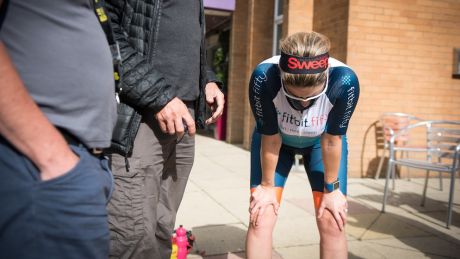How to Recover after the Big Race
The Fitbit Fifty challenge is over. How are our athletes recovering and what can you learn from their experiences?

It’s a truth quickly learned by every endurance athlete worth their sodium-based rehydration mix: you don’t get better during training, you get better during recovery. Once the hard work is done, your body rebuilds itself in the kitchen or under the duvet and (hopefully) comes back stronger, so it’s just as important to refuel and rest properly as it is to push yourself on that last set of sprints.
But what about after a big event? Yes, it might be fine to get straight back to training after a quick 5K around the park, but ultra-distance events such as the Fitbit Fifty – especially ones that take place over a number of days – take a lot more out of your system. In such cases, is it best to spend a week on the couch, get straight back on it or something in between?
Post-event recovery needs to happen on two fronts, from superficial muscle soreness and a more complicated array of hormonal effects. The first, at least, is relatively simple. Some (very) gentle activity will get oxygenated blood to the muscles to speed up the repair process, while fuelling properly will help offset the muscle breakdown that happens over ultra distances. For an athlete who’s determined to keep active, a heart-rate monitor such as the Fitbit Surge can come in handy, if only to remind you not to get out of your recovery zone (called the fat-burning zone on the Surge).
“Nicola [Doble] and I went for a two-mile recovery run a couple of days after the event,” says Elise Downing, who spent the nine months leading up to the Fitbit Fifty running around the UK coast. “This was followed by the much more important recovery bacon, coffee and pastry.” This isn’t too far off what the experts would recommend. Although glycogen replacement (that’s the pastry) takes a back seat once racing is no longer the priority, a good blend of protein and fats will help recovery.
Next up is sleep, which helps with neurological and hormonal factors, as well as muscular repair. “Deep sleep is crucial for recovery, because that’s when growth hormone is released,” says ultra-distance athlete, fell runner and physiotherapist Tim Budd. “And quality is just as important as quantity.” Alcohol disrupts REM sleep, which is when the biggest benefits of restfulness occur, so it’s a good idea to stay off the booze – celebratory tipples aside, of course.
There’s good news for early risers, too. Some studies suggest time spent in bed before midnight is more restorative than time afterwards. None of this has been a problem for our Fitbit challengers. “I slept for 13 hours the night after the challenge,” says Mollie Millington. “Then took my dog for a walk. For some reason, I wasn’t that hungry – but I guess that’s a side effect of forcing down food at unusual hours.”
For the dedicated athlete, there are also some moderately painful recovery options available. Massage is one option, with foam-rolling an alternative for those on a budget. “Massage is pretty important,” says Budd. “However, if I had one the day after an event it would be very light, nothing painful. Just enough to remind the muscles and soft tissues what it’s like to not be hammered in a race.” And there’s good news if you don’t fancy sitting in a wheelie bin full of ice – recent research suggests such ice baths are no more effective for reducing inflammation than a low-intensity warm-down.
Finally, there’s the question every endurance addict asks themselves almost as soon as they’ve crossed the finish line: when can I start training for the next one? Here, assessments vary: Fitbit Fifty athlete Natalie Doble, for example, crossed the finish line “already looking forward to a 30km Bear Grylls survival race,” but others recommend at least a couple of weeks’ respite before returning to serious exercise. If nothing else, it’s a good idea to keep runs and bike sessions fun, rather than focused. “I might take a few days off before getting back to running for fun, but aim to go back to proper training after two or three weeks,” says Budd. “Even the mental aspect – planning, logging etc – can take a toll. And remember, everything else counts, too – work, relationships and family all have an effect on your reserves, physically and mentally.
Not surprisingly, a few of the Fitbit Fifty athletes reported feeling mentally drained and not quite there in the days after the event – one good reason why it’s probably not a good idea to plan any life-changing presentations or job interviews for the week after a big event. “Keep a diary of stressors,” Budd advises, “and balance them with recovery and rest. If your nervous system decides it’s had enough because you've overtrained, then even with the best will in the world you won’t be getting any constructive training done.”
The bottom line, whether you’re an elite athlete covering hundreds of miles or a first-timer tackling a marathon, is to take some time to recognise what you’ve accomplished and why you enjoyed training in the first place. Your body and mind will thank you – and you’ll go faster next time.
Get the Coach Newsletter
Sign up for workout ideas, training advice, reviews of the latest gear and more.
From 2008 to 2018, Joel worked for Men's Fitness, which predated, and then shared a website with, Coach. Though he spent years running the hills of Bath, he’s since ditched his trainers for a succession of Converse high-tops, since they’re better suited to his love of pulling vans, lifting cars, and hefting logs in a succession of strongman competitions.

